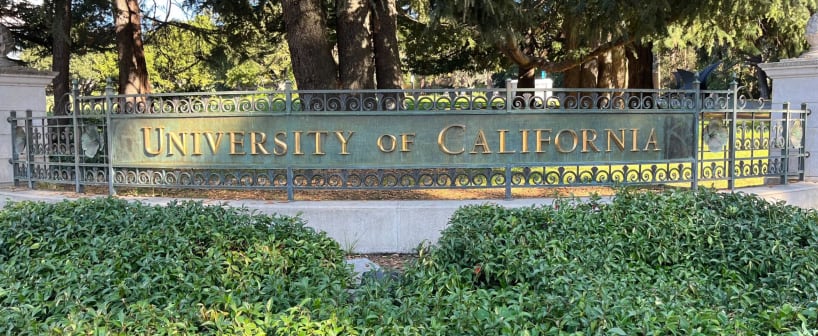By Margaret Attridge
Academic workers across the University of California (UC) system voted to authorize a “stand-up strike” over the university’s response to pro-Palestinian protests on campuses.
The over 48,000 workers are represented by the International Union, United Automobile, Aerospace, and Agricultural Implement Workers of America (UAW) as UAW 4811. Almost 20,000 members participated in the vote from May 13-15, with 79% voting in favor of strike authorization, according to the union.
In a stand-up strike, the UAW 4811 Executive Board will have the authority to call campuses to strike at certain times, rather than calling all workers to strike simultaneously. The board is expected to meet May 17, to decide if circumstances warrant calling campuses to strike.
The union called the strike authorization vote because of the university’s response to the protests, which it said endangered union members’ well-being and “unilaterally” changed working conditions.
The vote comes two weeks after pro-Israel counterprotesters tried to breach the barricade of the University of California, Los Angeles (UCLA) pro-Palestinian encampment, turning violent for several hours before police intervened, according to the Daily Bruin, UCLA’s student-run newspaper. The night after, the encampment was torn down and more than 200 pro-Palestinian protesters were arrested.
“At the heart of this is our right to free speech and peaceful protest,” Rafael Jaime, president of UAW 4811, said in a statement. “If members of the academic community are maced and beaten down for peacefully demonstrating on this issue, our ability to speak up on all issues is threatened.”
On top of the strike authorization vote, UAW 4811 filed multiple unfair labor practice (ULP) charges against UC. The union claims UCLA is violating its “policy of content neutrality toward speech” by showing a preference for individuals involved in pro-Israel speech over those involved in pro-Palestine speech.
The union also alleges UCLA has changed its free speech policies without notice or bargaining with the union and used “brute force and police intervention” to stop students from exercising their free speech rights.
“The UC regents have no excuse to allow campus administration to commit severe unfair labor practices, as was done at UCSD (the University of California, San Diego) and UCLA and reflected in the unfair labor practices filed by our union,” Jaime said.
“As days pass with no remedies for UC’s unfair labor practices, academic workers on more and more campuses are preparing to stand up to demand that our rights to free speech, protest, and collective action be respected.”
UC’s Office of the President sent a letter to the union members denying wrongdoing, saying that the university has a “duty to ensure that all speech be heard, that our entire community is safe, and that our property and common areas are accessible for all.”
Different Approaches
The union also acknowledged that the university system’s Berkeley and Riverside campuses have made progress toward protesters’ demands for “transparent and just investment practices.”
Berkeley’s “Free Palestine Encampment” reached an agreement with campus administration and took down most tents May 14, according to The Daily Californian, Berkeley’s student-run newspaper.
At UC Riverside, members of the Students for Justice in Palestine encampment reached an agreement with administrators May 3 after just five days of camping out on the campus, according to The Highlander, UC Riverside’s student-run newspaper.
“Although the agreements reached by no means represent an end to the movement, they demonstrate the power of this movement and prove that a way forward is possible when administrators negotiate rather than escalate violently against peaceful protesters,” a union statement read.
Is a Strike Legal?
UAW 4811 and UC have put out contradictory statements on whether a strike over the university system’s action is legal.
UC said in its letter that it strongly disagrees with the claim that its actions amount to unfair labor practices. It says that even if the Public Employment Relations Board finds that the university has engaged in an unfair labor practice, academic workers are prohibited from authorizing a strike under the terms of their collective bargaining agreement.
“The university’s position is that the union’s strike is unlawful, and as a result, a work stoppage is not protected strike activity,” the letter read.
“This means that participating in the strike does not change, excuse, or modify an employee’s normal work duties or expectations. And, unlike a protected strike, you could be subject to corrective action for failing to perform your duties.”
Additionally, UC warns that workers participating in a work stoppage would have their pay withheld and be subject to corrective action if they “actively obstruct” the university’s educational goals.
In a message to members, the UAW 4811 Executive Board says it filed an additional ULP charge against the university for labeling the potential strike as “unlawful,” calling it an “intimidation tactic.”
“The Public Employer-Employee Relations board has sole authority to determine the legality of a strike, and UC’s assertion contradicts decades of settled law,” the letter read.
“The Supreme Court and subsequent California case law has found that even when a contract has a no strikes clause, it does not waive workers’ rights to strike over serious unfair labor practices of the sort UC has committed, and participation in such a strike is protected activity.”

